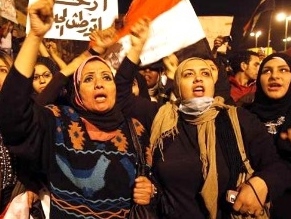|
World Jewish News

Protesters shout slogans during demonstrations in Cairo, January 29, 2011. Photo by: Reuters
|
Opposing sides in Egypt make headway on electoral reform
06.02.2011, Israel and the World Representatives from a wide range of Egypt's major opposition groups met Sunday with Vice President Omar Suleiman to discuss a blueprint for reforms to put the country on a path toward greater democracy.
Sunday's meeting was the broadest representation of Egypt's fragmented opposition to meet with the new vice president since anti-government protests began in the counry on Jan. 25.
Egypt's state news agency reported that the two sides agreed to set up a committee to study proposed constitutional amendments, including those dealing with electoral reform, such as who can run for president and presidential term limits.
The opposition groups represented in the talks included the youthful supporters of leading democracy advocate Mohamed ElBaradei, who are one of the main forces behind nearly two weeks of mass protests demanding the immediate ouster of longtime President Hosni Mubarak.
The outlawed Muslim Brotherhood, Egypt's largest opposition group, and a number of smaller leftist, liberal groups also attended the meeting, according to footage shown on state television.
Mubarak, Egypt's ruler of nearly 30 years, has rejected calls to step down immediately and instead promised a package of unspecified political reforms - part of a series of concessions the regime has made in an unsuccessful bid to quell the protests.
Earlier in the day, a spokesman for the Muslim Brotherhood reiterated demands that Mubarak respond to the demands of the protesters and step down.
"We are starting a round of talks to know how serious they are about responding to the demands of the people," spokesman Gamal Nassar told the German Press Agency dpa. "The demands of the people are clear. Mubarak has to step down."
The statement indicated that the group would not be willing to move forward in negotiations with the government without this demand being met.
The decision by the fundamentalist Brotherhood, which has been outlawed since 1954, to speak with the government comes as Egypt's leadership seeks to defuse the mass demonstrations by proposing reforms but stopping short of the protesters' key demand that Mubarak step down.
The talks are the first known discussions between the government and the Brotherhood in years, suggesting the group could gain an open political role in the post-Mubarak era along with other opposition political parties.
Negotiations with the opposition reflect the regime's apparent determination to end the crisis by placating protesters with reforms but keeping Mubarak in office until elections can be held as scheduled in September. The United States shifted signals and gave key backing to the regime's gradual changes on Saturday, warning of the dangers if Mubarak goes too quickly.
Vice President Suleiman and Prime Minister Ahmed Shafiq have rejected calls for Mubarak's immediate ouster, arguing that demanding his departure was a betrayal of the services he offered the country both as a career air force officer and president.
But senior Brotherhood leader Mohammed Mursi told The Associated Press the group was sticking to the protesters' main condition that Mubarak step down. He also rejected proposals that Suleiman take over from Mubarak on an interim basis to oversee reforms.
The Brotherhood aims to create an Islamic state in Egypt, but insists that it would not force women to cover up in public in line with Islam's teachings and would not rescind Egypt's 1979 peace treaty with Israel. During the recent crisis, the group also has called for a democratic and civic state.
The group, which fields candidates as independents, made a surprisingly strong showing in elections in 2005, winning 20 percent of parliament's seats. However, thousands of its members were arrested in crackdowns over the past decade and it failed to win a single seat in elections held late last year. The vote was heavily marred by fraud that allowed the National Democratic Party to win all but a small number of the chamber's 518 seats.
Haaretz.com
|
|
